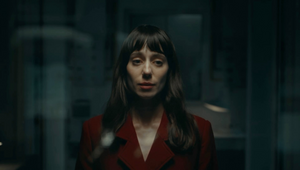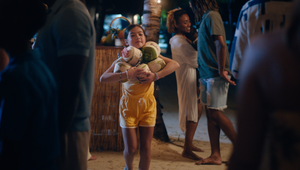
5 Minutes with… Natasha Maasri

Natasha Maasri is the creative driver behind one of our favourite campaigns this year, the punchy Safety for Safekeepers – Baklawa Got Legs film. It’s an unwavering, shocking, yet witty film that calls out Lebanon’s culture of sexual harassment aimed at women and girls. The film took home a Gold in the Entertainment category at this year’s Cannes Lions and won the Grand Prix for Good at Dubai Lynx. It’s not the first time that Natasha has channeled her creative energies into campaigning activist work – indeed drastic legal and social inequalities have rallied many female creatives in the country to use their skills to challenge society. Despite all that, or perhaps because of it, Lebanon’s ad scene has strong female representation.
Natasha is currently on her third stint at Leo Burnett Beirut, a strong agency in a country that’s renowned for being a creative hub in the region. But Natasha has also spent time working in Brazil, the country of her birth. Brazil’s exuberant, raucous sense of humour and craft are just as present in Natasha’s creative sensibilities as her Lebanese heritage – those two cultural influences are inextricably linked within her.
LBB’s Laura Swinton catches up with Natasha to find out more about how she came to advertising, her creative inspirations and Lebanon’s creative heritage and current challenges.
LBB> Born in Brazil yet Lebanese – how do these two cultures shape you and influence you?
Natasha> It’s shaped everything. From the way I think, to the languages I speak, my references... And even though they seem (and at times are) very different, there are a lot of common denominators and values, one of which is that they are both super passionate cultures. Anyone that knows me personally can attest that it’s a huge part of who I am. I can’t operate if I’m not passionate about something. They are also both very rich cultures, and I feel very lucky to have grown up in a household that treated both equally. I’m such a mixture that it doesn’t feel right saying I’m just Lebanese, or just Brazilian, I’m literally both.
LBB> Was creativity a big part of your childhood?
Natasha> We basically lived and breathed art. All our games or extracurricular activities had some sort of creative/artistic component to them. My father is an actor/director/writer, and my mother is an architect and fine arts teacher by trade. She actually used to pick our schools based on the type of art projects she saw displayed in the halls. She always said, “If they care enough about art, they are going to care about everything else”. One of my favorite pictures of me as a child, I’m about two or three years old sitting in my little chair, flipping through a book of the great Renaissance masters.
LBB> You came to advertising via graphic design and art direction – what was it about graphic design that so inspired you when you were starting out?
Natasha> I actually got into graphic design by chance. Growing up I wanted to be a costume designer. But I graduated high school in Brazil at the age of 15 and was too young (or so I was told) to go live by myself in Europe, where I wanted to study. So, I did one semester of fine arts at the University of Brasilia, and when that was over I moved to Lebanon and the major that I could transfer most of my credits to was graphic design. It was all supposed to be something temporary. But then I started loving it. Using visual arts to communicate messages to people. Making something more desirable simply by making it look attractive. But there was always an element of storytelling to my work. I loved doing research and then applying those findings to give more meaning to the project. Breathing a story into something has always been very appealing to me. I remember that once I spent an enormous amount of time reading books about Hindu culture, its deities and art to be able to do a design uplift of a brand of Indian food. Till this day, it’s one of my favourite projects, and probably one of the ones that made me realise that I was in the right major, even though I did ‘fall into it’ by mistake.
LBB> Your first advertising job was at Leo Burnett Beirut – what are your memories of those first months on the job and what was the agency like then?
Natasha> At first, I have to say I was very intimidated. It was such a bustling and vibrant office, filled with talented people. But I guess what marked me the most was everyone’s generosity with their talent. There were very few egos. It was, and still is, a learning environment, especially for people that are just starting out in the industry. And it’s thanks to this environment that even at the early stages in my career I was part of some culture-shifting campaigns.

One in particular was considered a trendsetter at the time. It was a Valentine’s campaign called ‘Make a Move’ for Exotica (Lebanon’s biggest flower shop chain). In the campaign we wanted women to make the first move on men, which was a taboo back then. It was a totally integrated campaign. We used crowdsourcing, and did on-ground activations. We even created a blogger to seed content (this blogger is still active today). It literally became the talk of the town for weeks and her reveal as part of the campaign was quite a big thing. Even though I left Leo Burnett (and came back twice) it was that initial exposure to such a nurturing creative and rich environment that shaped my way of thinking and working.

LBB> What was the most useful lesson you learned when you were learning the ropes?
Natasha> Don’t start any brief thinking you already know all you need to know to solve it. I believe you should be humble when approaching a brief. Pretend you know nothing, dissect it, dive into it. There has to be a period of discovery, research and learning before attempting to solve it. I think it’s the most important part of the process. If you start with a ‘know-it all’ mindset, the work more often than not will be totally unsurprising because there will be no depth to it.
LBB> You spent some time working in Brazil too. Brazil has such a vibrant creative scene and fantastic craft – what were your highlights working there?
Natasha> I truly think that creativity is part of Brazilian culture. As a people, Brazilians are super creative. I secretly pity anyone that doesn’t understand Portuguese because it’s a culture that is so rich, and has so much to offer. I mean, meme culture alone is worth learning Portuguese for (you will NOT be disappointed, mark my words). So, it’s only natural to me that the work that comes out of Brazilian agencies is also super creative. Culture is the base of what we do. I was fortunate to be at the right agency at the right time. The team at Ogilvy was stellar. I learned so much from my managers and from the people I worked with. It was without a doubt an important milestone in my career.
LBB> What pulled you back to Lebanon?
Natasha> I had been away from my family and my (other) country for a very long time. So, when the opportunity presented itself to not only come back, but to take on more responsibility, which is something I was craving, it felt almost serendipitous. And even though we are probably going through one of the toughest times in the country’s history I don’t regret the move.
LBB> Lebanon is such an interesting market – there’s a wealth of creative talent that has come from there and it’s also a country that continues to face many ongoing political and economic challenges. What’s that like as an environment to work in as a creative? Does it give you a sense of drive and purpose?
Natasha> Lebanon is for sure a creative hub. The amount of talent here is truly something remarkable and often surprises a lot of people that don’t know the country or its people. I think it takes an immense amount of effort to be creative in these extremely difficult conditions we are currently facing. It’s practically an act of rebellion. And I wholeheartedly appreciate any and every one that chooses to do so given the current circumstances, it’s truly inspiring. Creativity in difficult times is a lifeline and for many, a solace. One of my goals as a creative lead is to use brands as a platform to help expose local talent to the world, be it from the agency or the artists we bring on board.
LBB> I LOVE the Safety for Safekeepers - Baklawa Got Legs piece. Congratulations on all its success. Can you tell us what the seed of that idea was?
Natasha> Thank you, we are super proud of this work for many reasons. The obvious one is the amazing success and real impact it generated. But I’m also proud of the collaboration that went into it. It’s a brilliant example of a client, ABBAD, trusting us, Leo Burnett, as their agency. And us as an agency trusting the talent of the content creator, Remie Akl, who we chose to bring our campaign to life. Every single entity involved had a vital role in the success of the final work. It was true collaboration at its best.
LBB> The art direction, production design and styling absolutely sell the film and take it to the next level. That lime green is like a slap in the face, it’s brilliant! How did you and the team approach that side of the craft?
Natasha> I agree! The film, despite the heavy subject, is mesmerising. You can’t look away from it. And here I have to give all the credit to Remie and her production team. We trusted her vision. We chose her for her talent, the style of her work, and her subversive tone of voice. The matter we were tackling, sexual harassment, has been an issue in Lebanon for years. We wanted to find a fresh way to approach it and she was the perfect person to bring this to life. I believe the success of the campaign speaks for itself.

LBB> It struck me as so fierce and uncompromising in its attitude – and I’ve heard it said that in Lebanon many female creatives use their talents as a form of activism. What are your thoughts on that?
Natasha> I think this is the case not only in Lebanon and not only for women and gender inequality issues, but for any ‘marginalised’ group. Using creativity to face adversity (which in Lebanon we surely have our fair share of) is not only a form of activism but an act of rebellion. And advertising can be a powerful platform. There is power in being able to change the narrative, and when that power is harnessed for good, it’s unstoppable.
LBB> Moreover, I know there are a lot of awful inequalities legally for women in Lebanon but on the other side, I think there’s something unique about the number of female creative leaders and founders in the country. Where does that come from?
Natasha> This is so true and something I often wondered about after I left Lebanon to work in Brazil and the US. Female under-representation in creative agencies was never a ‘thing’ in Lebanon, even when I started back in 2005. Quite the contrary, we’ve always had a much larger number of women working in the creative department. We used to joke that we were ‘Leo Banett’ (which means girls in Arabic) or ‘Lea Burnett’. So, it struck me as very odd that under-representation was an issue in other parts of the world.
I have come up with a theory throughout the years, and I must stress that this is my theory, based on my observations in different regions. I think that having the sensitivity to ‘be creative’ might have been perceived as a ‘female’ trait in the past? One thing I know for sure is that, having this large number of women leading a communication business, in a country where there are so many things to say, to fix and change when it comes to gender inequality, has generated some of the most interesting campaigns I’ve seen on the subject, globally. And I’m sure we are going to see much more of those.
LBB> Obviously this past year has been really hard on the country – what impact did the blast have on the team at Leo’s and on the ad community generally? How are things recovering?
Natasha> This is not an easy question to answer. The blast, better yet, surviving the blast was something none of us were equipped to deal with. (How does one prepare for such a thing anyways?). We are basically all walking miracles. Everyone has their own experience, so I will speak for myself here. It was terrifying. Then enraging, then sad then enraging again. By far the most difficult and trying challenge I’ve had as a team leader, as a human. I had no idea how to speak to my team after it happened. No idea how to motivate them, when I, myself, was totally unmotivated and questioning everything. And I’ve been trying to be super aware of how everyone is doing on an emotional level, because each person reacts to trauma differently. We all did our best and are still doing our best because the situation in the country is in a dire state. Yet somehow in the midst of all that we created amazing work. We are fighters. All of us. Not resilient, Lebanese people cannot stand being labeled as resilient anymore. Resilience has a certain passiveness to it, an acceptance of the status quo. We are way beyond that now. And every time we show up, every email answered, every project delivered, is us fighting. We are fighting so that eventually we don’t have to fight anymore.
LBB> Outside of your day job, you’ve also helped with campaigns about hunger, illiteracy, ageism as well as women’s rights. Why are these projects important to you? And as a creative do you think it’s important to have a personal cause or purpose?
Natasha> I am actually very happy to say that all of this was done during my day job. These were all subjects I tackled (and hopefully succeeded) through existing clients. And thanks to this interview, I’ve noticed that this has always been the way I like to work, starting from university till now. I’m constantly looking for an opportunity to attach a purpose to the work (FYI a purpose can also be making people happy, nowadays that seems a pretty noble cause to me). I see any brief as an opportunity to communicate something more than just information. If I couldn’t do that, I probably wouldn’t be in the industry anymore.
LBB> Looking back across your career, which other creative campaigns are you proudest of and why?
Natasha> That’s like asking to choose your favourite child! Jokes aside, I’m proud of different campaigns for different reasons. I’ve been lucky enough to be part of several campaigns that got a lot of exposure, recognition and generated impact. But a campaign that I hold very dear to my heart is ‘No Rights No Women’. It was a purely passion-led project, done with my best friends that worked at the agency at the time (some of them are still here). It was a true grassroots movement that took on a dimension that none of us were expecting. It truly became massive.

Fun fact about this campaign: part of the engagement was adding a mustache to your profile picture, and we did it before Facebook filters were a thing. So, we actually asked women that wanted to participate and didn’t know how to add the graphic to their profile pictures to send them to us, and we did it manually and sent it back. What I love about it the most was the passion we had for the subject and the work, and that passion yielded amazing participation and engagement. The campaign helped change a law and won 26 international awards, including five Cannes Lions.

LBB> What is the most exciting thing about the industry at the moment?
Natasha> How fast it’s adapting and learning from current culture. I find it exciting; it just opens up a whole new world of possibilities. There is no longer a ‘right way’ to do things. Absolutely everything around us is an opportunity. I think we finally understood that the best thing we can do is listen to what is happening in the world. All the answers are out there. You listen, you observe, you apply and repeat.
LBB> And the most frustrating?
Natasha> Settling for what feels safe. To state the obvious, there is safety in being safe. But there is also sameness in being safe.















